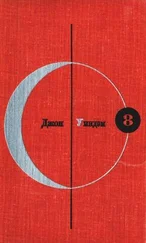Джон Уиндем - Consider Her Ways
Здесь есть возможность читать онлайн «Джон Уиндем - Consider Her Ways» весь текст электронной книги совершенно бесплатно (целиком полную версию без сокращений). В некоторых случаях можно слушать аудио, скачать через торрент в формате fb2 и присутствует краткое содержание. Жанр: Фантастика и фэнтези, на английском языке. Описание произведения, (предисловие) а так же отзывы посетителей доступны на портале библиотеки ЛибКат.
- Название:Consider Her Ways
- Автор:
- Жанр:
- Год:неизвестен
- ISBN:нет данных
- Рейтинг книги:5 / 5. Голосов: 1
-
Избранное:Добавить в избранное
- Отзывы:
-
Ваша оценка:
- 100
- 1
- 2
- 3
- 4
- 5
Consider Her Ways: краткое содержание, описание и аннотация
Предлагаем к чтению аннотацию, описание, краткое содержание или предисловие (зависит от того, что написал сам автор книги «Consider Her Ways»). Если вы не нашли необходимую информацию о книге — напишите в комментариях, мы постараемся отыскать её.
Consider Her Ways — читать онлайн бесплатно полную книгу (весь текст) целиком
Ниже представлен текст книги, разбитый по страницам. Система сохранения места последней прочитанной страницы, позволяет с удобством читать онлайн бесплатно книгу «Consider Her Ways», без необходимости каждый раз заново искать на чём Вы остановились. Поставьте закладку, и сможете в любой момент перейти на страницу, на которой закончили чтение.
Интервал:
Закладка:
"I was married — for a little time," I told her.
She contemplated that for some seconds, then:
"It must be a very strange experience to be owned," she remarked reflectively.
"Owned?" I exclaimed in astonishment.
"Ruled by a husband," she explained sympathetically.
I stared at her.
"But it — it wasn't like that — it wasn't like that at all," I protested. "It was — " But there I broke off, with tears too close. To sheer her away I asked:
"But what happened? What on earth happened to the men?"
"They all died," she told me. "They fell sick. Nobody could do anything for them, so they died. In little more than a year they were all gone — all but a very few."
"But surely — surely everything would collapse?"
"Oh, yes. Very largely it did. It was very bad. There was a dreadful lot of starvation. The industrial parts were the worst hit, of course. In the more backward countries and in rural areas women were able to turn to the land and till it to keep themselves and their children alive, but almost all the large organizations broke down entirely. Transport ceased very soon: petrol ran out, and no coal was being mined. It was quite a dreadful state of affairs because although there were a great many women, and they had outnumbered the men, in fact, they had only really been important as consumers and spenders of money. So when the crisis came it turned out that scarcely any of them knew how to do any of the important things because they had nearly all been owned by men, and had to lead their lives as pets and parasites.
I started to protest, but her frail hand waved me aside.
"It wasn't their fault — not entirely," she explained. "They were caught up in a process, and everything conspired against their escape. It was a long process, going right back to the eleventh century, in southern France. The Romantic conception started there as an elegant and amusing fashion for the leisured classes. Gradually, as time went on, it permeated through most levels of society, but it was not until the latter part of the nineteenth century that its commercial possibilities were intelligently perceived, and not until the twentieth that it was really exploited.
"At the beginning of the twentieth century women were starting to have their chance to lead useful, creative, interesting lives. But that did not suit commerce: it needed them much more as mass consumers than as producers — except on the most routine levels. So Romance was adopted and developed as a weapon against their further progress and to promote consumption, and it was used intensively.
"Women must never for a moment be allowed to forget their sex, and to compete as equals. Everything had to have a 'feminine angle' which must be different from the masculine angle, and be dinned in without ceasing. It would have been unpopular for manufacturers actually to issue an order 'back to the kitchen,' but there were other ways. A profession without a difference, called 'housewife,' could be invented. The kitchen could be glorified and made more expensive; it could be made to seem desirable, and it could be shown that the way to realize this heart's desire was through marriage. So the presses turned out, by the hundred thousand a week, journals which concentrated the attention of women ceaselessly and relentlessly upon selling themselves to some man in order that they might achieve some small, uneconomic unit of a home upon which money could be spent.
"Whole trades adopted the romantic approach and the glamor was spread thicker and thicker in the articles, the write-ups, and most of all in the advertisements. Romance found a place in everything that women might buy from underclothes to motorcycles, from 'health' foods to kitchen stoves, from deodorants to foreign travel, until soon they were too bemused to be amused any more.
"The air was filled with frustrated moanings. Women maundered in front of microphones yearning only to 'surrender,' and 'give themselves,' to adore and to be adored. The cinema most of all maintained the propaganda, persuading the main and important part of their audience, which was female, that nothing in life was worth achieving but dewy-eyed passivity in the strong arms of Romance. The pressure became such that the majority of young women spent all their leisure time dreaming of Romance, and the means of securing it. They were brought to a state of honestly believing that to be owned by some man and set down in a little brick box to buy all the things that the manufacturers wanted them to buy would be the highest form of bliss that life could offer."
"But — " I began to protest again. The old lady was now well launched, however, and swept on without a check.
"All this could not help distorting society, of course. The divorce rate went up. Real life simply could not come near to providing the degree of romantic glamor which was being represented as every girl's proper inheritance. There was probably, in the aggregate, more disappointment, disillusion, and dissatisfaction among women than there had ever been before. Yet, with this ridiculous and ornamental ideal grained-in by unceasing propaganda, what could a conscientious idealist do but take steps to break up the short-weight marriage she had made, and seek elsewhere for the ideal which was hers, she understood, by right?
"It was a wretched state of affairs brought about by deliberately promoted dissatisfaction; a kind of rat-race with, somewhere safely out of reach, the glamorized romantic ideal always luring. Perhaps an exceptional few almost attained it, but, for all except those very few, it was a cruel, tantalizing sham on which they spent themselves, and of course their money, in vain."
This time I did get in my protest.
"But it wasn't like that. Some of what you say may be true — but that's all the superficial part. It didn't feel a bit like the way you put it. I was in it. I know."
She shook her head reprovingly.
"There is such a thing as being too close to make a proper evaluation. At a distance we were able to see more clearly. We can perceive it for what it was — a gross and heartless exploitation of the weaker-willed majority. Some women of education and resolution were able to withstand it, of course, but at a cost. There must always be a painful price for resisting majority pressure — even they could not always altogether escape the feeling that they might be wrong, and that the rat-racers were having the better time of it.
"You see, the great hopes for the emancipation of women with which the century had started had been outflanked. Purchasing power had passed into the hands of the ill-educated and highly suggestible. The desire for Romance is essentially a selfish wish, and when it is encouraged to dominate every other it breaks down all corporate loyalties. The individual woman thus separated from, and yet at the same time thrust into competition with, all other women was almost defenceless; she became the prey of organized suggestion. When it was represented to her that the lack of certain goods or amenities would be fatal to Romance she became alarmed and, thus, eminently exploitable. She could only believe what she was told, and spent a great deal of time worrying about whether she was doing all the right things to encourage Romance. Thus, she became, in a new, subtler way, more exploited, more dependent, and less creative than she had ever been before."
"Well," I said, "this is the most curiously unrecognizable account of my world that I have ever heard — it's like something copied, but with all the proportions wrong. And as for 'less creative' — well, perhaps families were smaller, but women still went on having babies. The population was still increasing."
The old lady's eyes dwelt on me a moment.
"You are undoubtedly a thought-child of your time, in some ways," she observed. "What makes you think there is anything creative about having babies? Would you call a plant pot creative because seeds grow in it? It is a mechanical operation — and, like most mechanical operations, is most easily performed by the least intelligent. Now, bringing up a child, education, helping her to become a person, that is creative. But unfortunately, in the time we are speaking of, women had, in the main, been successfully conditioned into bringing up their daughters to be unintelligent consumers, like themselves."
Читать дальшеИнтервал:
Закладка:
Похожие книги на «Consider Her Ways»
Представляем Вашему вниманию похожие книги на «Consider Her Ways» списком для выбора. Мы отобрали схожую по названию и смыслу литературу в надежде предоставить читателям больше вариантов отыскать новые, интересные, ещё непрочитанные произведения.
Обсуждение, отзывы о книге «Consider Her Ways» и просто собственные мнения читателей. Оставьте ваши комментарии, напишите, что Вы думаете о произведении, его смысле или главных героях. Укажите что конкретно понравилось, а что нет, и почему Вы так считаете.











